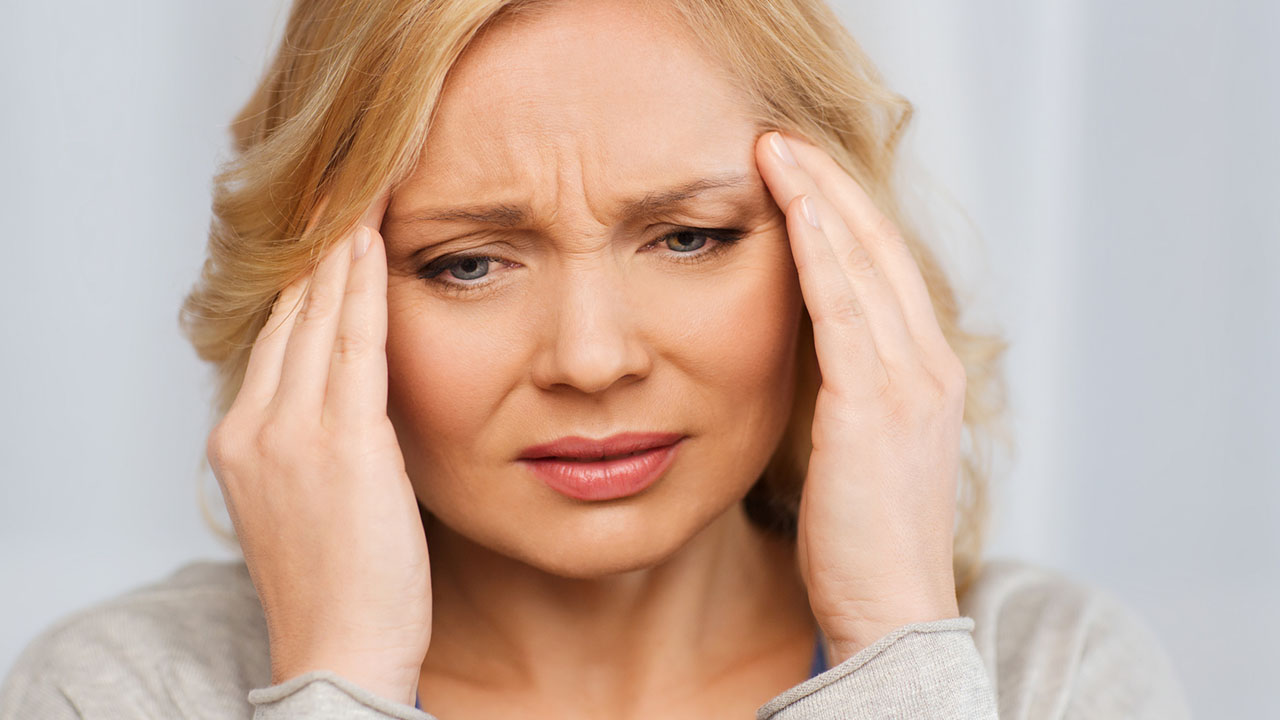 Syda Productions/Fotolia
Syda Productions/Fotolia
Years ago, when you had your first period, you probably figured out quite quickly that hormones can cause more than just monthly bleeding. Irritability, upset stomach, depression, acne, headache and many other symptoms occur as a part of your premenstrual syndrome (PMS). It only makes sense that those same hormones can create a host of issues later in life during menopause in addition to the loss of your period. Headaches are a common symptom of menopause, although the type of headache and its severity will vary from one woman to the next.
How do hormone levels affect headaches? When a woman is younger and still ovulating, headaches are most common a couple of days before bleeding begins and continue through the first few days of the cycle when estrogen and progesterone levels both fall. Experts believe the decrease in estrogen levels during menopause may also play a role in menopause-related headaches.
During a woman's menstrual cycle, estrogen causes blood vessels to dilate. Then, progesterone causes those same blood vessels to constrict. As the hormones fluctuate, blood vessels are forced to expand and contract repeatedly. The result is a rather unpleasant headache. Since hormones fluctuate greatly during menopause, these fluctuations can cause menopausal headaches.
Women entering menopause may suffer from several different types of headaches. These include:
- Migraines: These are the most intense form of headache, with moderate-to-severe pulsating pain usually on one side of the head or behind the eyes. Nausea, vomiting, blurred vision, and sensitivity to light and sound are common symptoms. There are two types, with and without aura. An aura may include visual disturbances, numbness or tingling in the face or fingers, mental confusion, or a distorted sense of taste, smell, or touch. These auras occur before a migraine headache and may be seen as a warning sign. Others experience migraines without the aura and do not report any of these sensory distortions.
- Tension headaches: This type of headache may be due to stress, anxiety or other causes that are not well-understood. The pain may feel like a tight band around the forehead and back of the head and neck and is usually less severe than a migraine but still described as moderate. There are no accompanying symptoms such as vomiting, nausea or auras.
- Sinus headaches: The sinuses are located behind the forehead and cheekbones. During a sinus headache, the pain feels deep and constant and may increase when you move your head. If there is an infection, antibiotics are usually given, and decongestants may help decrease sinus swelling. Interestingly, sinus headaches have often been found to actually be migraines or tension headaches.
Every woman is different, so her response to menopause hormone fluctuations will be unique. Some women who have suffered from migraines their entire lives find that the onset of menopause brings relief from monthly debilitating headache symptoms. Others find that migraines start for the first time or worsen around perimenopause because of new hormonal fluctuations. Many women find that hormonal migraines usually stop after menopause when hormone levels are consistently low.
There are several ways for women to deal with headaches during menopause. Biofeedback, relaxation techniques, changes in diet, stress reduction, acupuncture, and regular sleep/wake schedules are all natural methods to help relieve headache pain. Many women find that yoga and meditation help to reduce stress-related headaches. Since certain foods and drinks can also play a part in triggering headaches, keeping a food diary may be beneficial in identifying your personal food triggers.
If none of these methods work to reduce your headache pain, talk to your doctor about medications that may help to lessen your hormone-related headaches. There are a number of over-the-counter and prescription medications that may decrease the frequency of the headaches. Hormone therapy may be an option for some women, but others may find hormone therapy makes their headaches worse. Work with your doctor to come up with a headache plan that works for you.
References:
Premenstrual syndrome (PMS) fact sheet. WomensHealth.gov. Retrieved February 15, 2016. http://www.womenshealth.gov/publications/our-publications/fact-sheet/premenstrual-syndrome.html
Migraines May Worsen During Menopause. WebMD, Retrieved February 15, 2016. http://www.webmd.com/menopause/news/20140624/migraines-may-worsen-during-menopause
Hormonal Headaches. Menopause Health Matters. Retrieved February 15, 2016. http://menopausehealthmatters.com/symptoms-of-menopause/hormonal-headaches/
Headaches and Menopause. Abogel.uk.com. Retrieved February 15, 2016. http://www.avogel.co.uk/health/menopause/symptoms/headaches/
My-Oh-Migraine: Hormonal Headaches & Menopause. The North American Menopause Society. Retrieved February 15, 2016. http://www.menopause.org/for-women/menopauseflashes/women's-health-and-menopause/my-oh-migraine-hormonal-headaches-menopause
Managing the Hormones and Headaches of Menopause. Everyday Health. Retrieved February 15, 2016. http://www.everydayhealth.com/menopause/managing-hormones-and-headaches.aspx
Sinus Headaches. WebMd. Retrieved February 16, 2016. http://www.webmd.com/migraines-headaches/guide/sinus-headaches
Reviewed February 16, 2016
By Michele Blacksberg RN




